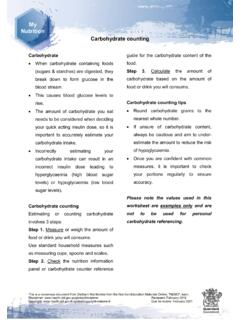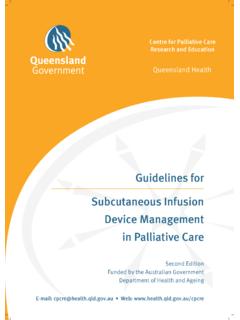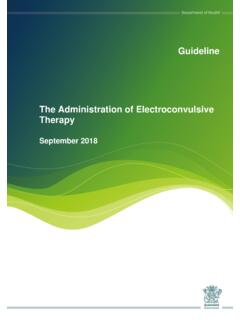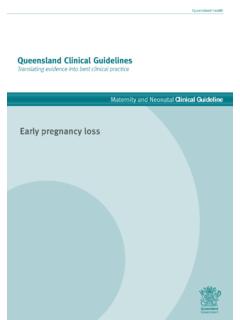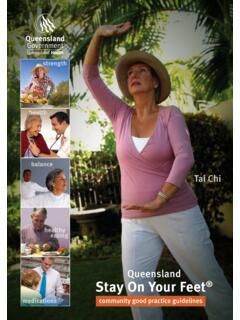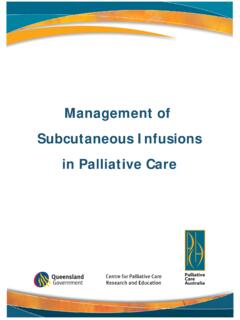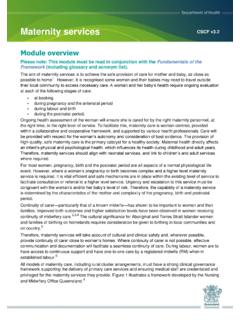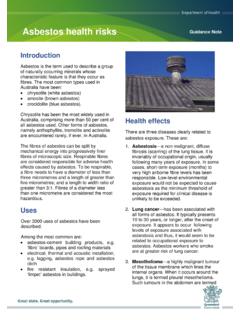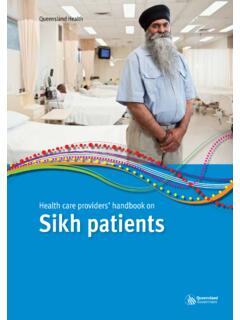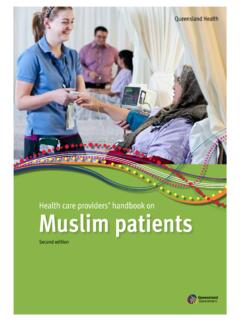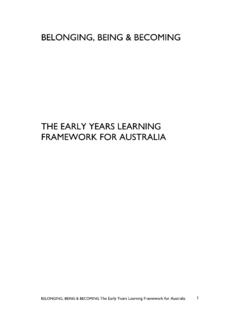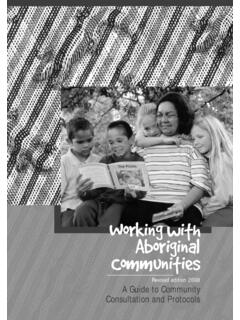Transcription of sad news sorry business - Queensland Health
1 Queensland HealthGuidelines for caring for aboriginal and torres strait Islander people through death and dying sor r y businesssad newsAcknowledgment Sad News, sorry business : Guidelines for caring for aboriginal and torres strait Islander people through death and dying was researched and developed by the aboriginal and torres strait Islander Cultural Capability Team. The authors extend their sincere thanks to the Queensland Health staff for generously providing their wisdom, advice and and torres strait Islander people should be warned that this document refers to the sensitive issue of death and document is licensed under a Creative Commons Attribution Australia view a copy of this licence, visit State of Queensland ( Queensland Health ) [2015]You are free to copy, communicate and adapt the work, as long as you attribute the State of Queensland ( Queensland Health ).
2 For more information contact:Cultural Capability Statewide Team PO Box 48 BRISBANE QLD News, sorry business : Guidelines for caring for aboriginal and torres strait Islander people through death and dying (version 2)Published by the State of Queensland ( Queensland Health ), December 20151 Guidelines for caring for aboriginal and torres strait Islander people through death and dying Purpose ..2 Section 1 aboriginal and torres strait Islander cultural capability ..3 Cultural respect and recognition ..4 Communication ..5 Relationships and partnerships ..6 Capacity building ..9 Section 2 The final stages of life ..10 Before the passing ..10 Time of passing ..10 Traumatic or sudden death ..11 Section 3 Time after passing ..12 Sad News, sorry business ..12 Open disclosure ..14 Coronial investigations ..14 Glossary ..15 Resource list.
3 16 Contents2 Sad news, sorry businessThe end stage of life is a very sensitive and significant time for patients and their loved ones. This document aims to provide insight into appropriate cultural knowledge and practices and identify tools that will assist Queensland Health staff in providing culturally and clinically responsive care for aboriginal and torres strait Islander patients and their families through this significant stage of aboriginal and torres strait Islander people, the time before and following death are subject to a number of customary practices. These practices have meanings that are sacred to aboriginal and torres strait Islander people, and disclosing them is not the intentions of these guidelines. Queensland Health recognises the rights of aboriginal and torres strait Islander peoples to practise their cultural and spiritual traditions and customs without discrimination or and torres strait Islander peoples are not a homogenous group and must be recognised as two distinct and diverse cultures.
4 Furthermore, customary practices vary between, and within, aboriginal and torres strait Islander tribal groups. There are over fifty aboriginal language groups in Queensland and two primary languages in the torres strait . A single hospital or Health service may be accessed by a number of tribal groups, each with their own cultural practices, language and a different view on caring for a person at the end of life guidelines are intended to be respectful and sensitive to this diversity; hence aiming to provide general guidance and broad information for Queensland Health note that some generalisations can be made for aboriginal people and some for torres strait Islander people throughout this document. Where possible, guidance will be provided with respect to the two distinct version 2 Sad News, sorry business : caring for aboriginal and torres strait Islander people through death and dying was first published in 2014, Queensland Health published the aboriginal and torres strait Islander Patient Care Guideline which provides general information with respect to providing healthcare for aboriginal and torres strait Islander this revision of Sad News, sorry business , duplication of content which is now available in the patient care guideline has been avoided.
5 It is therefore highly recommended that the patient care guideline be read as a preliminary to Sad News, sorry 2 also includes additional advice, in particular for the time following a person s possible, hospital and Health services are encouraged, through the guidance and knowledge of their aboriginal and torres strait Islander staff and in partnership with their local communities, to establish specific local guidelines to ensure appropriate, culturally competent for caring for aboriginal and torres strait Islander people through death and dying aboriginal and torres strait Islander cultural capabilitySection 1 The Queensland Health aboriginal and torres strait Islander Cultural Capability Framework 2010 2033: articulates the requirements of achieving successful provision of culturally appropriate Health services to and with aboriginal and torres strait Islander individuals and communities is the overarching framework to guide every aspect of Health service delivery for and with aboriginal and torres strait Islander Queenslanders.
6 This will require all Queensland Health staff, individually and collectively, to understand and respect cultural differences and needs, and apply this understanding in their various roles. The framework s four guiding principles will be applied to caring for an aboriginal and/or torres strait Islander person and their family faced with Respect and Recognition PrincipleA culturally capable Queensland HealthRespect for aboriginal and torres strait Islander perspectives of death and dying; recognising that they may differ in principle to mainstream perspectives. However, they are comparable in their value to the patient and their of the historical impact on the cultural beliefs and practices of aboriginal and torres strait Islander peoples, and how that impact has led to current communication is essential in providing optimal care.
7 It is a critical tool in building rapport with the patient and their families, and especially important during the time leading up to and following one s knowledge of appropriate aboriginal and torres strait Islander cultures is the essence of achieving individual cultural capability, in particular, knowledge that impacts on one s practice and increases one s confidence in caring for aboriginal and torres strait Islander is essential to foster relationships and partnerships with key cultural conduits which may include aboriginal and torres strait Islander Hospital Liaison Officers, aboriginal and torres strait Islander Health Workers, certain community leaders and senior members of the and Partnerships PrincipleCommunication PrincipleCapacity Building Principle4 Sad news, sorry businessCultural respect and recognitionDeath, a confronting certainty of life, varies in meaning between all cultures.
8 Appreciating the differences in the meaning of death is essential for providing the best care for all patients at their final stages of life. The term passing is generally more accepted and sensitive terminology to use when discussing death or dying with aboriginal and torres strait Islander people due to the spiritual belief around the life to colonisation, aboriginal and torres strait Islander traditional cultures had well established beliefs and practices that had been handed down through the generations. The country was home to hundreds of different traditional groups with their own language , customs, relationship with their environment and beliefs. Some traditional groups shared similarities, reflecting their inter-tribal significant factors dramatically altered aboriginal and torres strait islanders Colonisation and religion Traditional cultures were significantly impacted by colonisation and the introduction of Christianity.
9 Traditional people and cultures were systematically suppressed as Western lifestyles and religions were imposed. Almost all aspects of aboriginal and torres strait Islander cultures were forbidden or discouraged, including practices associated with death and dying and the sharing and passing down of this Past government policies Past policies including dispossession, dislocation, segregation, assimilation, removal of mixed race children and integration greatly impacted traditional aboriginal and torres strait Islander cultures and and torres strait Islander cultural capabilitySection 13. Immigration Australia has seen an influx of people from a variety of nations since colonisation. Each nationality came to Australia with their culture, inclusive of beliefs and practices associated with death and dying, which their descendants may still practise today.
10 Some beliefs and practices have impacted on aboriginal and torres strait Islander cultures, for example as a result of intermarriage with people of other cultures. Beliefs and practices for aboriginal and torres strait Islander people may therefore vary in Queensland these impacting factors mean that many cultural practices have been modified or lost. However, some aboriginal and torres strait Islander people still maintain traditional beliefs and practices that are an essential part of the life and death and healthcareIt is our professional duty to deliver care that is appropriate to our patient including care that is responsive to our patients needs as expressed in their way and from their perspective. Differences exist between non-Indigenous and aboriginal and torres strait Islander Australians perspectives on healthcare, wellbeing, death and dying.
